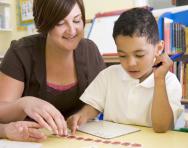Making friends and play for SEN kids: parents' tips

Through playing together, children learn that other people may have different ways of seeing the world, and so they learn to empathise and cooperate. However, making friends doesn’t come easily for all children.
Children with autism, Attention Deficit Hyperactivity Disorder (ADHD) or dyspraxia, for example, may struggle to form friendships, due to the nature of their impairment. Other children may lack confidence or have communication difficulties, which makes social interaction harder.
But there are ways you can help teach your child to overcome these difficulties and make friends. Forming friendships takes practice, and you can help your child by rehearsing social situations and role-playing. With a bit of detective work and ingenuity you can find out which children interact well with yours and encourage new friendships for your child.


Boost your child's maths & English skills!
- Follow a weekly programme
- Maths & English resources
- Keeps your child's learning on track
Here are some practical tips which have been suggested to Scope by parents and professionals who work with children who have special educational needs.
- Identify goals
Think about short-term and long-term development of social skills. Break down those stages of development into tiny steps and create the “scaffolding” to support each step for your child.When you are teaching the social skills to make friendships, try breaking them down into small, easy steps. Give plenty of encouragement for each goal your child reaches.
- Invite friends home
It can be worth asking your child’s teacher if there are children at school they seem to connect with. (A good mainstream school should set up ‘peer mentors‘ or ‘buddies’ for children with special educational needs; teachers usually look for existing positive relationships other classmates have with your child, and identify someone who they can guide to help with encouraging appropriate communication skills.)Encourage friendships by inviting the children they suggest for after-school playdates. Your child will usually be more relaxed in their home environment and will be more able to work on appropriate social interaction. At the end of the playdate, talk to your child about what they learned and what they would like to do next time. With friends, there’s always a next time!
- Furry friends
Pets often make great friends for children with special educational needs. They offer unconditional love, and in return children learn about responsibility and easing social interaction.
- Prepare an activity
Build play dates around fun, interesting activities all children will enjoy. Think creatively and prepare in adavance; you could try giving children a ball of pizza dough, for example, and have a pizza-making lunch. All children tend to love all special needs "kit", sensory features, trampolines and so on, so let them get stuck in!
- Get to know potential friends
Volunteer to help in class or during school trips and play detective. Notice who sits next to your child and who interacts with them best. Could you invite these children for play dates and encourage a blossoming friendship?
- Be informed
A classic book called No One to Play with: Social side of Learning Disabilities by Betty B Osman is well worth a read. Some of the terminology is a bit out of date, but the ideas within are still highly relevant. For older children and young adults, the National Autistic Society has produced an excellent guide, Social skills for adults and adolescents.
Parents' SEN friendships tips
Practise turn-taking
'My son struggles with sharing, taking turns, going first or last. I try to make him practise and prepare him as much as possible at every opportunity, be it dishing up at the table or getting into the car. It definitely helps with his social skills.'
Encourage parallel play
'Don’t knock parallel play… it's a start! My son with ASD doesn’t like to interact much but he will happily engage in the same activities alongside other people. It can fuel interaction or friendships – especially if there is a common shared interest.'
Teach your child to ask questions
"I coached my daughter in how to make conversation by playing a role-play game with her. I pretended to be a reporter interviewing her about her Moshi Monsters collection, then we swapped roles and she interviewed me. She enjoyed being the interviewer!"
Be guided by their interests
"I include friends in my son’s hobbies. My son has had a lifelong interest in art museums, so we often take a friend to a gallery. Another fascination is carnivorous plants, so I accompanied a group of his peers to the botanical garden to see the Venus fly traps."
Know their limits
"Sometimes I push my son to tolerate longer periods of socialising; but I also know to be flexible when I see a shift in mood or agitation. When he was younger, I limited play dates to about an hour, but now he enjoys his friends' company for up to two hours. Being sensitive to his mood increases his interest in planning future play dates."
Raise awareness with kids as well as parents
"It’s good to be honest and upfront with other children about your child’s needs. I noticed my daughter was getting stared at in Brownies so I did a short talk to the pack about her disabilities and how they affect her. It really helped."
Enjoy the limelight
"Show and tell sessions at school have been very helpful for my son, who doesn’t make friends easily. It gives him a chance to talk to other children and enjoy a bit of social interaction and communication. "
Choose supervised activities
"Over the years, I have found my son has responded better socially in activities that are supervised and organised by adults. Cubs and Scouts were a success as he liked the structure and boundaries. Now an adult he still responds well to rule-based activities or heavily-refereed sports!"
Scope offers information, advice and support about disability. Scope’s online community has a dedicated tips section for parents to share suggestions and ideas on all aspects of supporting children with special educational needs. They welcome new tips from parents and would love to hear your feedback.

Give your child a headstart
- FREE articles & expert information
- FREE resources & activities
- FREE homework help








